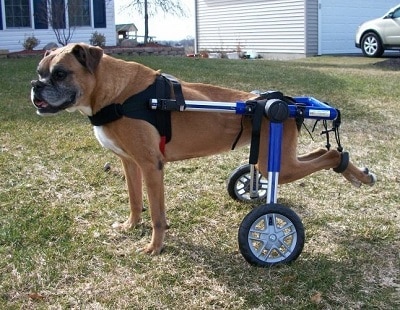Adopting any dog is a noble cause as it gives them a second chance at a life away from the loneliness of rescue centers and the lack of one to one attention. Adopting a dog with mobility issues is even more noble but it does come with a lot of extra challenges that you need to consider before you bring them home.
Make sure you have a home which is appropriate
Mobility issues mean a dog will struggle to get around places without a flat floor unassisted. Homes with mandatory stairs (stairs you have to take often to get around normally) to get in or out can become problematic and you may have to carry them a lot – at first this may seem doable and easy but it will wear you down. This is especially true if you yourself have mobility issues.
Apartments and flats which are not on the ground floor are not appropriate despite all your best intentions. These kinds of accommodation are not ideal even for healthy dogs so adopting one with joint problems should be avoided.
The ideal home to bring home a pooch with mobility issues are those with segregated rooms (so that they can be kept safely when you’re not around) and a garden to give them exercise without the need to constantly move them around.
Your choice of furnishing isn’t essential but it can be optimised to cater for your new pooch – consider thick carpets on the floor which will offer a spongy platform to walk on and a soft landing should they fall. Removing all objects which could potentially cause them to trip is recommended. Consider investing in some stairs and steps to help them get on the sofa.
Specialist diet
Speak with the managers over at the rescue center to find out what food your dog is already eating to try and keep their life consistent. Fish based foods are great for joint problems and foods rich in fibre will help their digestion move normally. Supplements could also make a big difference in their quality of life.
Patience and time

It takes a great deal of patience, time and determination to take care of disable dogs. The fact that they aren’t as energetic as healthy dogs does not make it easier- in fact it probably makes it harder. Be prepared for plenty of backward steps along the way and many accidents both from you and the dog itself.
They can be clumsy, incontinent, grumpy and at times expensive but with enough patience you can cultivate a long lasting and loving companionship. Using some mobility aids won’t come naturally and they’ll need to be trained to use them.
The time aspect is an important one to consider. Do you have the time to be able to care for them properly and to help rehabilitate or manage their mobility issues so that it doesn’t become worse? Adopting a dog with mobility issues is not encouraged for those who work 8 hours a day and are just looking for a dog with low energy and low demands for walks etc. Dogs with impaired movement still need exercise!
Money
Disabled dogs are arguably more expensive to keep than healthy dogs. Depending on their exact issues they may need speciality products such as ramps, memory foam dog beds, a speciality diet, joint supplements and harnesses designed for dogs with lame limbs. Can you afford to look after such a dog?
A low energy household
Disabled dogs like to go at their own pace, some are forced to go slowly. A household with a lot of energy from small children and other pets is not an ideal scenario for these kinds of dogs. Dogs with any kind of physical issues may be susceptible to anxiety so a nice and calm household is recommended.
Closing comments
Adopting a dog with mobility issues is a rewarding thing to do but a lot of preparation needs to be done to ensure you’re giving them the best chance to have a good life. Please don’t adopt a disabled dog without thinking it through, if you have read the above and realised it may not be the best partnership it is best to walk away and allow the right person to come along and give them their happy forever home.
Related Articles



